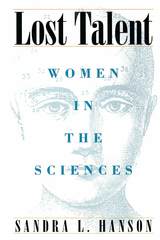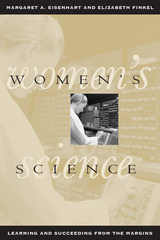2 books about Women science students

Lost Talent
Sandra L. Hanson
Temple University Press, 1996
"Sandra Hanson demonstrates the progressive loss of women to science--and science to women--through discriminatory actions and policies of key institutions and unequal resources offered to young women and men. Her detailed analyses disclose the complex process by which gender, race and class determine who stays in science--and why."
--Mary Frank Fox, School of History, Technology, and Society, Georgia Institute of Technology
In this pathbreaking book, Sandra Hanson asks what compels so many talented young women to leave the professions of science and mathematics? When do they leave and why? Why do equally qualified girls and boys have such different experiences with science education? What are the patterns for women who do stay in school and pursue a scientific career? What difference does family background make? Exactly how significant are differences of race and class?
In this research project, Hanson examines several unusually large and subtle, nationally representative, longitudinal data sets. The data include information on a multitude of distinctions by race, class background, school experiences, school resources, to name a few. Hanson examines this information with a particular focus on the differences in achievement within and across the disciplines, varying access to physical resources, and differential activities in both math and science for young women in the education process.
The challenge faced by the United States in the next two decades is developing a balanced, qualified, and well-trained workforce for jobs in science and other technical fields. For Hanson it includes equity for women and creating conditions such that young girls who start out doing well in science do not end up with little training and knowledge. The recovery of this "lost talent" is the central concern of this book.
"Lost Talent compels us to think about the experiences of women in science in an entirely new and comprehensive way--how they differ from men in their activities, achievement, access, and attitudes about science. Particularly refreshing is Hanson's recognition that women scientists are not a monolithic group. I found her broadened focus on women of various race and ethnic groups more inclusive and informative that previous books on women in science."
--Shirley Vining Brown, Senior Research Scientist, Special Populations Group, Educational Testing Service
"Lost Talent is a pathbreaking work. It is concerned with the relatively low long term rate of female involvement and achievement in science. Much of the effort to understand the origins of these phenomena has focused on single factors, usually examined at a moment in time, and frequently based on unrepresentative samples and inconsistent measures. Sandra Hanson seeks to remedy many of these deficiencies in this book. Her dynamic, multidimensional approach deepens our insights into the complex patterns and produces new evidence about the trajectories of these women among the various states of science involvement within the education system and their major determinants. It will be required reading for all who seek to better our understanding of this important issue."
--Alan Fechter,, President, Commission on Professionals in Science and Technology
[more]

Women's Science
Learning and Succeeding from the Margins
Margaret A. Eisenhart and Elizabeth Finkel
University of Chicago Press, 1998
Are there any places where women succeed in science? Numerous studies in recent years have documented and lamented a gender gap in science and engineering. From elementary school through college, women's interest in science steadily declines, and as adults, they are less likely to pursue careers in science-related fields.
Women's Science offers a dramatic counterpoint not only to these findings but also to the related, narrow assumption that "real science" only occurs in research and laboratory investigation. This book describes women engaged with science or engineering at the margins: an innovative high school genetics class; a school-to-work internship for prospective engineers, an environmental action group, and a nonprofit conservation agency. In these places—where people use or rely on science for public, social, or community purposes—the authors found a remarkably high proportion of women. Moreover, these women were successful at learning and using technical knowledge, they advanced in roughly equal percentages to men, and they generally enjoyed their work.
Yet, even in these more marginal workplaces, women had to pay a price. Working outside traditional laboratories, they enjoy little public prestige and receive significantly less financial compensation. Although most employers claimed to treat men and women equally, women in fact only achieved success when they acted like male professionals.
Women's Science is an original and provocative contribution that expands our conception of scientific practice as it reconfigures both women's role in science and the meaning of science in contemporary society.
Women's Science offers a dramatic counterpoint not only to these findings but also to the related, narrow assumption that "real science" only occurs in research and laboratory investigation. This book describes women engaged with science or engineering at the margins: an innovative high school genetics class; a school-to-work internship for prospective engineers, an environmental action group, and a nonprofit conservation agency. In these places—where people use or rely on science for public, social, or community purposes—the authors found a remarkably high proportion of women. Moreover, these women were successful at learning and using technical knowledge, they advanced in roughly equal percentages to men, and they generally enjoyed their work.
Yet, even in these more marginal workplaces, women had to pay a price. Working outside traditional laboratories, they enjoy little public prestige and receive significantly less financial compensation. Although most employers claimed to treat men and women equally, women in fact only achieved success when they acted like male professionals.
Women's Science is an original and provocative contribution that expands our conception of scientific practice as it reconfigures both women's role in science and the meaning of science in contemporary society.
[more]
READERS
Browse our collection.
PUBLISHERS
See BiblioVault's publisher services.
STUDENT SERVICES
Files for college accessibility offices.
UChicago Accessibility Resources
home | accessibility | search | about | contact us
BiblioVault ® 2001 - 2024
The University of Chicago Press









